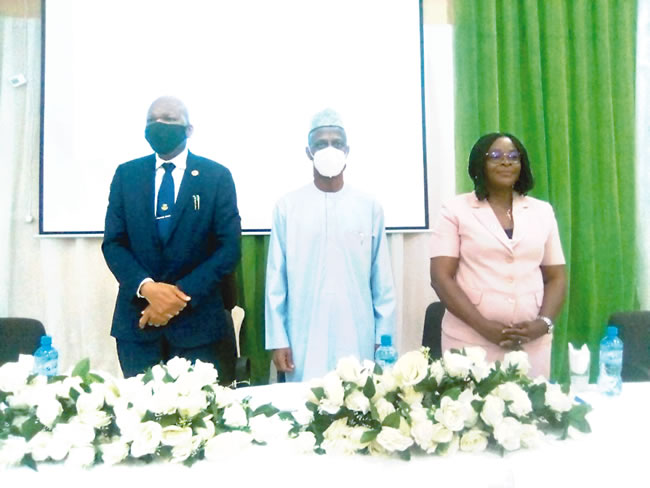THE importance of letting Nigerian farmers know that having insurance coverage as a vital part of their businesses in order to guarantee stable and sustainable food production in the country has been made known to farmers’ associations as well as government at all levels.
They have also been called upon to take advantage of insurance guarantee and subsidy regimes in the agro-industrial value chains emplaced by the Central Bank of Nigeria (CBN), its offshoot, the Nigeria Incentive-Based Risk Sharing System for Agricultural Lending (NIRSAL Plc) and the Nigerian Agricultural Insurance Corporation (NAIC).
Weather-related risks thwart agricultural productivity gains especially in the face of climate change. Agricultural insurance serves as a reliable risk mitigation instrument for coping with climate-related hazards. This notwithstanding, agricultural insurance penetration among smallholder farmers in the Nigeria remains low.
Weather is an important factor of production in agriculture, but remains unpredictable. Climate change and variability lead to changes in rainfall patterns and extreme events such as drought and floods. Several farm families consequently are faced with the prospects of tragic crop failure, livestock mortality, food insecurity, dispossession and migration. Climate-related hazards constraints economic prospects derived from agriculture thus disrupt rural economies.
Agricultural insurance has been identified to be a very important tool in assisting farmers, herders and governments lessen some negative financial impact of adverse natural events. Apparently, insurance has been used by many countries to help manage agricultural risks.
Specialists, however, said encouraging farmers and agro-investors to embrace insurance through NIRSAL and NAIC windows of guarantee and subsidy on premiums payables respectively is desirable.
Managing Director/CEO, NIRSAL Plc, Abdulhameed Aliyu, noted that the agency guarantees loans facilitated by the CBN through commercial banks for agro-industrial businesses, especially in the Anchor Borrowers’ Programme.
He noted that NIRSAL guarantees cover on bank loans ranges from 30 to 75 percent.
Aliyu in a statement noted that after all due diligence, if an agricultural loans becomes bad, NIRSAL will refund the facilities up to the tune of 75 per cent, assuring commercial and micro-finance banks participating in the agricultural loan schemes of the Federal Government through the CBN.
According to him, over the years, NIRSAL had facilitated the flow of more than N150 billion into agriculture from multiple sources.
“At least, N124 billion of that sum came from commercial banks who leveraged NIRSAL’s Credit Risk Guarantee (CRG) facility in addition to investing in de-risked, structured, and well-monitored projects to make high investment returns.
“While NIRSAL Plc relies on the high level of control afforded it by its innovative value chain solutions as a safeguard for its risk exposure, the banks rely on same, in addition to the CRG facility for the safety of their financial investments.
“We are happy to yet again demonstrate our willingness and capability to support agro-allied companies across the country to grow their businesses, engage smallholder farmers, and earn foreign exchange for the Nigerian economy.”
Folashade Joseph, Managing Director of NAIC noted that NAIC offers a 50-per cent subsidy on food crops but the subsidy does not apply to cash crops such as cashew, cocoa and palm oil insurance.
She said it runs a subsidy regime on insured crops such as “rice, maize, yam, cassava, sorghum, guinea corn, beans, soya beans and indeed, all food crops.
“Subsidised livestock include poultry, cattle, goats and sheep, rabbits and fishery, among others. Dogs, camels, donkeys and horses are on commercial basis,” she said.
Joseph stated that NAIC had paid out about N2.0 billion in about last five years as compensation to various categories of insured farmers across the country.
She said this was in line with the corporation’s policy of “prompt settlement of claims within a maximum of 14 days to pay genuine claims if complete documents are made available to NAIC by farmers or their agents.”
Despite the available windows, most farmers are not pleased with the way insurance companies are been run because they have in one way or the other lost their farm produce due to fire disaster, flooding, theft, draught among others and there has not been any meaningful response from the companies to relieve them of their loses.
They lamented that insurance companies, which are supposed to provide cover for farmers at such a time do not help issues, as the insurance system put in place does not favour farmers.
Ayo Fatona, an agricultural insurance specialist with Leadway Assurance said the CBN-NIRSAL guarantee of agricultural loans is one of the best incentives to deepen insurance in agriculture and ensure food security as the population increases rapidly and economy downturn escalates.
He said that guaranteeing a credit facility to the tune of 75 per cent would go a long way in assuring lenders and the safety and recovery of financial facilities in cases of business failure, bad debt and eventual inability of borrowers to repay loans.
President, Cocoa Farmers Association of Nigeria (CFAN), Adeola Adegoke, said there has been emphasises that peasant farmers need to be insured, that they need to embrace viable insurance policy.
“That is what we are agitating and imploring the government at all levels to come to the aid of the peasant farmers to create a kind of soft landing in case of any natural disaster or incidence in their farms. The recurrence of this is for the farmers’ farms to be insured because these are natural disasters and natural disasters are not presentable.
“They are things that normally happen and if you recall in the last 20 years our farmers have been experiencing this kind of tragedy and there is no assistance from the government at all levels to come to the aid of these vulnerable farmers.
Adegoke further stated that the government should look at the area of insurance, that naturally disasters happen but when it happens, what did the government do about it?
According to him, “In Ghana today, an average farmer is having a pension. They are moving to those things that would safeguard and protect the interest of peasant farmers. If the government is looking at that to make sure that no farmer is left unsecure to sustain our production, farmers would be highly secured in terms of making sure that they are good.
Emmanuel Ijewere, Vice President Nigeria Agribusiness Group (NAGB) stated that insurance is a contract between the person who owns the goods and the insurance company.
“It is what you agreed with the insurance company that they will cover, it is possible they did not include fire as one of the items to be covered by the insurance company, it is a contract that is documented. The insurance company cannot run unilaterally from the contract, you just state clearly what you are insuring if you are insuring against flood, there is flood if you are insuring again fire there is fire, if you are insuring against theft or pest, whatever you are insuring should be listed there,” he said.
YOU SHOULD NOT MISS THESE HEADLINES FROM NIGERIAN TRIBUNE
We Have Not Had Water Supply In Months ― Abeokuta Residents
In spite of the huge investment in the water sector by the government and international organisations, water scarcity has grown to become a perennial nightmare for residents of Abeokuta, the Ogun State capital. This report x-rays the lives and experiences of residents in getting clean, potable and affordable water amidst the surge of COVID-19 cases in the state…
Selfies, video calls and Chinese documentaries: The things you’ll meet onboard Lagos-Ibadan train
The Lagos-Ibadan railway was inaugurated recently for a full paid operation by the Nigerian Railway Corporation after about a year of free test-run. Our reporter joined the train to and fro Lagos from Ibadan and tells his experience in this report…
[ICYMI] Lekki Shootings: Why We Lied About Our Presence — General Taiwo
The Lagos State Judicial Panel of Inquiry probing the killings at Lekki Toll Gate, on Saturday resumed viewing of the 24hrs footage of the October 20, 2020 shooting of #EndSARS protesters by personnel of the Nigerian Army…
ICYMI: How We Carried Out The 1993 Nigerian Airways Hijack —Ogunderu
On Monday, October 25, 1993, in the heat of June 12 annulment agitations, four Nigerian youngsters, Richard Ajibola Ogunderu, Kabir Adenuga, Benneth Oluwadaisi and Kenny Razak-Lawal, did the unthinkable! They hijacked an Abuja-bound aircraft, the Nigerian Airways airbus A310, and diverted it to Niger Republic. How did they so it? Excerpts…
Sahabi Danladi Mahuta, a community mobiliser and APC chieftain. Mahuta spoke to select journalists at the sidelines of an Islamic conference in Abuja recently. Excerpts…
WATCH TOP VIDEOS FROM NIGERIAN TRIBUNE TV
- Let’s Talk About SELF-AWARENESS
- Is Your Confidence Mistaken for Pride? Let’s talk about it
- Is Etiquette About Perfection…Or Just Not Being Rude?
- Top Psychologist Reveal 3 Signs You’re Struggling With Imposter Syndrome
- Do You Pick Up Work-Related Calls at Midnight or Never? Let’s Talk About Boundaries






